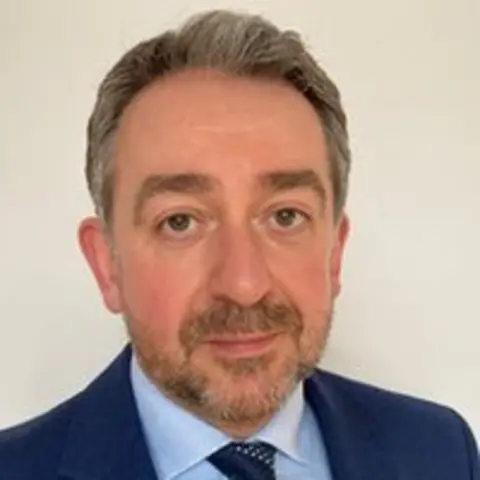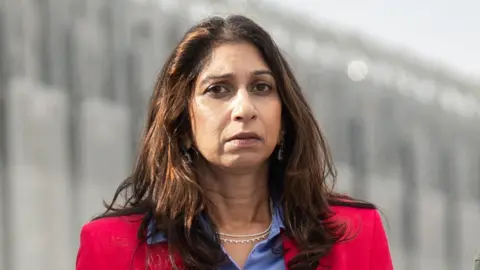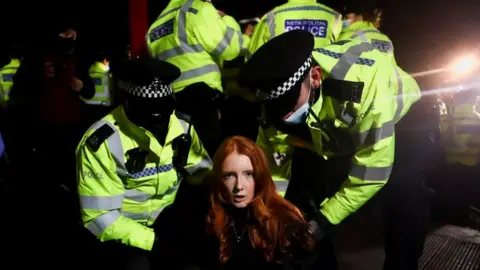Why Suella Braverman can't stop Palestinian protests

 PA Media
PA MediaAs things stand, there is going to be a potentially huge pro-Palestinian march in London, on Armistice Day - and there is nothing Home Secretary Suella Braverman alone can do to stop it.
The reason for that is simple: the law does not tell the Met Police commissioner Sir Mark Rowley to take into account the views of ministers. It tells him to assess the risks to the public - and make a plan accordingly.
Since the Gaza conflict began, the Palestinian Solidarity Campaign (PSC) has organised three national protests in London on successive Saturdays that have grown larger week-on-week.
It has negotiated with the police over the route and duration of each and abided by conditions.
The police have a delicate balancing act to perform in protecting free speech and assembly - and also protecting the rights of others not to be intimidated.
The Met says where protesters have supported terrorist groups, broken racial-hatred laws, or committed other offences, they have made arrests. So far, more than 200 have been arrested - each serious in its own terms, including some allegations of support for Hamas - which is a proscribed terrorist group in the UK.
But put those numbers in the wider context of public order policing in London.
On Monday alone, police arrested 219 Just Stop Oil demonstrators who tried to stop traffic near Parliament. The Extinction Rebellion "sit-ins" of more than two years ago saw officers cart away a staggering 4,118 demonstrators.
Opponents of the PSC say marchers are chanting deeply antisemitic slogans and providing a cover for extremists. But while individuals can be arrested for hate crime offences, the legal test for banning an event is more complex.
Critical legal tests
The Public Order Act 1986 gives Sir Mark Rowley and other police chiefs the power to apply conditions to marches where they reasonably believe there could be:
- Serious public disorder
- Serious damage to property
- Serious disruption to the lives of the community
- Intimidation of others
The PSC has agreed to conditions under that law. Its supporters say they will gather an hour after the two-minute silence on Armistice Day and more than a mile away from the Cenotaph. Their march, ending with a rally at the US Embassy, is planned to go nowhere near the memorial.

Rishi Sunak has described holding a march on Armistice Day as disrespectful and a risk to the Cenotaph or other memorials.
But given the PSC has repeatedly abided by conditions imposed on its previous marches, the only conclusion the police can reach - unless they get intelligence to the contrary - is that a risk to the Cenotaph won't come from protesters on the march route.
And that's why the force has concluded there is no legal justification to ask the home secretary to ban the march.
That power can only be used if a police chief believes they cannot prevent "serious public disorder". That basically means violent crowds potentially bent on running amok. The police haven't seen that in previous weeks.
So if police commanders asked the home secretary to ban the march, the organisers could go to court - and judges would need to see evidence and intelligence proving the serious risk.

Do you plan to attend a protest? Get in touch.
- Email [email protected]
- WhatsApp: +44 7756 165803
- Tweet: @BBC_HaveYourSay
- Upload your pictures or video
- Please read our terms & conditions and privacy policy

EDL ban
The last time these powers were used was in 2011 and 2012. The then-home secretary, on the recommendation of the Met, banned the far-right English Defence League (EDL) from marching through Muslim communities. The EDL was considered to be a thuggish mob and marchers would regularly chant racist or Islamophobic slogans.
The Campaign Against Antisemitism says the "River to the Sea" chant, that will almost certainly be heard on Saturday's march, is deeply offensive and threatening - but the PSC event is not going through Jewish communities - and the Met says that its legal advice is that the slogan can be legitimate free speech in such circumstances.
What would happen if the march were banned? The Met believes people would still come to London and stand in the street and peacefully have their say. The police cannot stop them. The last time they tried, it was a fiasco.
In March 2021, the organisers of a vigil for murdered Londoner Sarah Everard cancelled the event. They feared they would individually face enormous fines under the then Covid lockdown rules, if they were seen to encourage the gathering.
 Reuters
ReutersBut there was such confusion over whether there was still a right to protest, regardless of the risk of transmitting the virus, that people turned out anyway. They felt so strongly about the horrific murder they wanted to be heard. The Met ended up paying compensation to women who were arrested.
So the huge risk is that, even if Suella Braverman got her way, people would not only come out, but they would march independently. That would be twice as hard for police because there would be no organisers on the ground directing events and calling on people to abide by a route and curfew.
Far right 'emboldened'
And then there is the risk of counter-demonstrations.
Former Met commander Dal Babu says Ms Braverman's attack on the forthcoming march has emboldened the extreme far right.
Stephen Yaxley-Lennon, founder of the largely defunct English Defence League under the alias Tommy Robinson, is calling on followers to join him near the Cenotaph. Other less well known figures are doing the same.
"I've never known an occasion for the home secretary to get involved in operational policing at this level," says Mr Babu. "She doesn't understand the law. She doesn't understand the legislation."
So is there anything the home secretary could do to force the Met to ban the march?
If Ms Braverman is satisfied that the Met is "failing to discharge any of its functions in an effective manner" she can direct the Mayor of London to intervene.
But that is a power designed to be used in exceptional circumstances. And she is not allowed to use that power until she has first consulted the inspectorate of police forces, the expert body on how chief constables are performing.
Sir Tom Winsor, former HM Chief Inspector of Constabulary, told BBC Radio 4's Today programme that Ms Braverman had "crossed the line".
"The operational independence of the police is not a debatable matter," he said. "The policing protocol order made by this home secretary in June 2023... stresses the operational independence of the police.
"It is the will of Parliament and the government that the police shall not be open to improper political interference that the police must act with impartiality, including political impartiality."

More on Israel-Gaza war
- Follow live: Latest updates
- From Gaza: Palestinian given two hours to evacuate whole neighbourhood
- From Israel: Pain still raw a month after Hamas attacks
- Watch: BBC's Jeremy Bowen in Gaza with Israeli forces
- Explained: Who are the hostages taken by Hamas from Israel?
- History behind the story: The Israel-Palestinian conflict

Sign up for our morning newsletter and get BBC News in your inbox.

